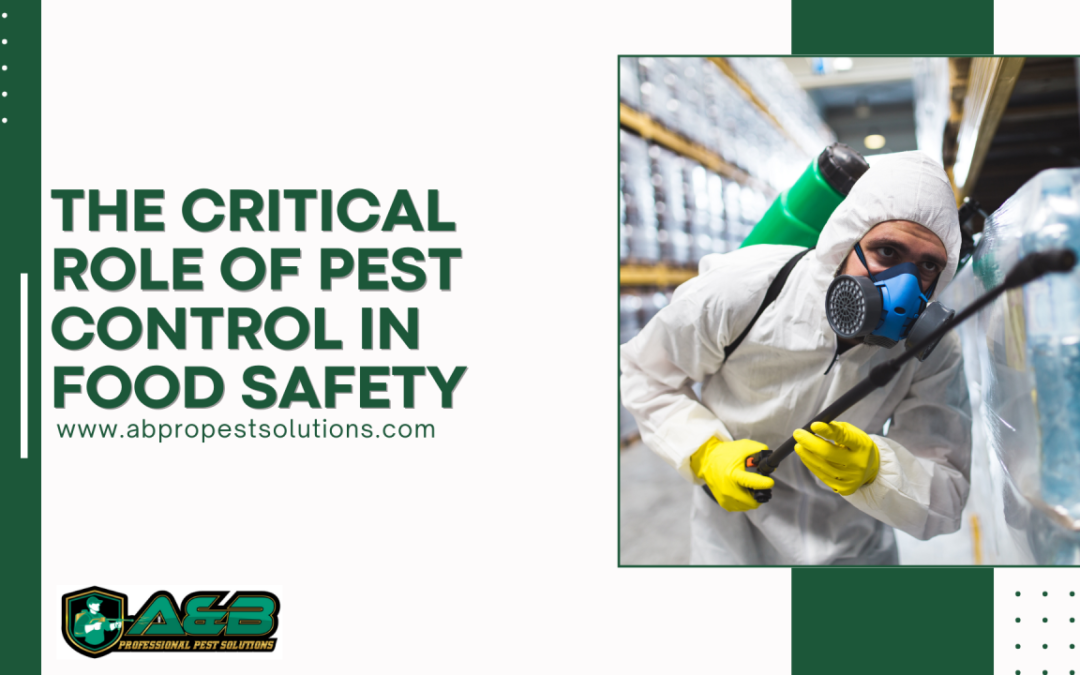Maintaining a pest-free environment is crucial for ensuring food safety across all stages of the food supply chain, from production and processing to storage and distribution. Pests can carry and spread harmful pathogens, contaminate food products, and cause significant economic losses. Effective pest control strategies are essential for safeguarding public health, complying with regulatory standards, and protecting a business’s reputation.
Importance of Pest Control in Food Safety
1. Prevention of Contamination:
- Pathogen Transmission: Pests such as rodents, cockroaches, and flies are known carriers of pathogens like Salmonella, E. coli, and Listeria, which can contaminate food and cause serious foodborne illnesses. Effective pest control minimizes the risk of these pathogens entering the food supply.
- Physical Contaminants: Pests can also introduce physical contaminants such as fecal droppings, hair, and body parts into food products, leading to contamination and potential health risks.
2. Compliance with Regulatory Standards:
- Food Safety Regulations: Regulatory bodies such as the FDA, DOH, BAI & NMIS mandate strict pest control measures as part of food safety standards. Compliance with these regulations is essential for legal operation and market access.
- GMP and HACCP: Good Manufacturing Practices (GMP) and Hazard Analysis Critical Control Point (HACCP) systems require comprehensive pest management plans to ensure food safety and quality.
3. Protection of Brand Reputation:
- Consumer Trust: Food safety incidents related to pest contamination can severely damage a company’s reputation and erode consumer trust. Maintaining a robust pest control program is critical to safeguarding a brand’s image and ensuring customer confidence.
- Economic Impact: Contaminated products can lead to costly recalls, legal liabilities, and loss of business. Preventive pest control measures help mitigate these risks and protect the financial health of a business.
Effective Pest Control Strategies
1. Integrated Pest Management (IPM):
- Preventive Measures: IPM focuses on long-term prevention through sanitation, exclusion, and habitat modification. Regular cleaning, proper waste management, and sealing entry points are essential to prevent pest infestations.
- Monitoring and Detection: Continuous monitoring using traps, sensors, and regular inspections helps detect early signs of pest activity. Data from these monitoring efforts guide targeted interventions.
2. Sanitation and Hygiene:
- Routine Cleaning: Maintaining high standards of cleanliness in food production and storage areas is critical. Regular cleaning schedules help eliminate food and water sources that attract pests.
- Waste Management: Proper disposal of food waste and maintaining clean waste storage areas prevent pests from accessing food sources.
3. Exclusion Techniques:
- Sealing Entry Points: Inspect and repair any gaps, cracks, and openings in walls, doors, and windows to prevent pests from entering the facility.
- Physical Barriers: Installing screens, door sweeps, and air curtains can effectively block pest entry points and protect sensitive areas.
4. Chemical Controls:
- Targeted Use of Pesticides: When necessary, use pesticides in a targeted and controlled manner to minimize exposure and environmental impact. Always follow safety guidelines and use approved products.
- Non-Chemical Alternatives: Employ mechanical controls, like traps, to reduce reliance on chemical treatments.
Pest control is a critical component of food safety, essential for preventing contamination, complying with regulations, and protecting a business’s reputation. Implementing effective pest control strategies, such as Integrated Pest Management, sanitation, exclusion, and targeted chemical use, ensures a safe and hygienic food supply chain. By prioritizing pest control, businesses can safeguard public health and maintain consumer trust.
To know more about A&B’s services, please visit the A&B’s website (www.abpestsolutions.com.ph) or Facebook Page (https://www.facebook.com/ABPestSolutions/) to know more about their services. A&B also disinfects workplaces or houses to kill COVID-19 Virus.
You may also contact: +63 905 496 4550 and +63 951 062 4830
A&B Professional Pest Solutions Corporation is located at the Ground Floor of Monterey Building at Genesis St., Centro de San Lorenzo, Santa Rosa, 4026 Laguna, Philippines

